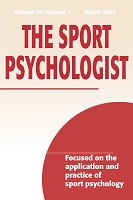The Sport Psychologist.

Volume 21, Issue 4 (December 2007)
Applied Research
Jamie Poolton, Richard S.W. Masters, Jon P. Maxwell
pages 375-382
Should the Coaches of Elite Female Handball Teams Focus on Collective Efficacy or Group Cohesion?
Jean-Philippe Heuze, Gregoire Bosselut, Jean-Philippe Thomas
pages 383-399
A Qualitative Study of Sport Enjoyment in the Sampling Years
Paul J. McCarthy, Marc V. Jones
pages 400-416
Multiple Goal Orientations as Predictors of Moral Behavior in Youth Soccer
Luke Sage, Maria Kavussanu
pages 417-437
Flow Experience and Athletes' Performance With Reference to the Orthogonal Model of Flow Nektarios A. Stavrou, Susan A. Jackson, Yannis Zervas, Konstantinos Karterliotis pages 438-457
Enhancing the Evaluation of Effectiveness With Professional Judgment and Decision Making
Amanda Martindale, Dave Collins pages 458-474
Improving the Delivery of Applied Sport Psychology Support Through Reflective Practice
Brendan Cropley, Andrew Miles, Sheldon Hanton, Ailsa G. Niven
pages 475-494
BOOK REVIEW - Psychological Bases of Sport Injuries (3rd Ed.)
Lois Butcher-Poffley
pages 495-496
BOOK REVIEW - Essential Readings in Sport and Exercise Psychology
Diane Finley
pages 497-498
BOOK REVIEW - The College Athlete's Guide to Academic Success: Tips From Peers and Profs
Cheryl Weiss
pages 499-501
TSP, 21(4), December 2007, Copyright © 2007
Improving the Delivery of Applied Sport Psychology Support Through Reflective Practice
Brendan Cropley, Andrew Miles, Sheldon Hanton, Ailsa G. Niven
Abstract
This article offers an exploration of factors that influence the effectiveness of applied sport psychology delivery through reflection on a series of consulting experiences. Knowledge gained by a British Association of Sport and Exercise Sciences (BASES) trainee sport psychologist (Cropley), through a process of reflective practice during the first year of supervised experience, is presented around a number of themes that have emerged from current literature regarding the characteristics of effective service providers (A. Anderson, A. Miles, P. Robinson, & C. Mahoney, 2004). It is argued that reflection improves self-awareness and generates knowledge in action that can enhance the delivery of applied sport psychology. Support is therefore provided for the adoption of reflective practice as a tool for personal and professional development
TSP, 21(4), December 2007, Copyright © 2007
Flow Experience and Athletes' Performance With Reference to the Orthogonal Model of Flow
Nektarios A. Stavrou, Susan A. Jackson, Yannis Zervas, Konstantinos Karterliotis
Abstract
The purposes of the current study were to examine (a) the differences in Flow State Scale (FSS) subscales between the 4 experiential states of the orthogonal model (apathy, anxiety, relaxation, and flow), (b) the relationship between challenge, skills, and flow experience; and (c) the relationship between flow experience and athletes' performance. Two hundred twenty athletes volunteered to participate in this study. Challenge of the game and skills of the athlete were measured before and after competition. Thirty minutes after the competition, the FSS was used to measure flow experience. In addition, subjective and objective measures of athletes' performance were assessed. Athletes in the flow and relaxation states revealed the most optimal states, whereas the athletes in the apathy state showed the least optimal state. There were positive associations between athletes' flow experience and their performance measures, indicating that positive emotional states are related to elevated levels of performance. On the other hand, there were low or no correlations between athletes' performance and reported challenge of the game, whereas skills of the athlete were moderately correlated with flow. Multipleregression analysis demonstrated significant prediction of athletes' performance based on flow experience during competition. Future research should examine the relationship between flow, athletes' performance, and additional dispositional and state variables.
TSP, 21(4), December 2007, Copyright © 2007
Enhancing the Evaluation of Effectiveness With Professional Judgment and Decision Making
Amanda Martindale, Dave Collins
Abstract
On the basis of anecdotal evidence and media interest, the public profile of applied sport psychology is ever increasing in terms of its perceived impact on the performance of elite athletes and teams. In the profession, however, there is some concern over whether we are managing to concurrently match this pace empirically, through the evolution of scientific methods and mechanisms to evaluate the effectiveness of practice. This article considers requirements of the current evaluation climate and provides an overview of existing formal evaluation procedures. It is suggested that the evolving intricacies and complexities of applied sport psychology practice are neither fully captured nor represented by these procedures. Consequently, a framework of professional judgment and decision making (PJDM) is proposed from which to consider the evaluation of practice. In addition, methods and mechanisms for enhancing and building on our current evaluation procedures are offered.
0 comentarios